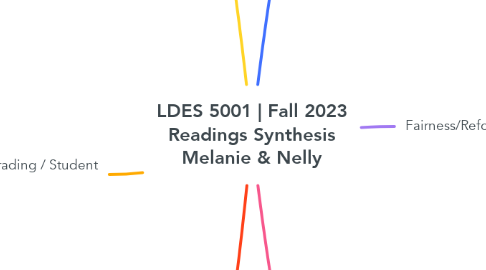LDES 5001 | Fall 2023 Readings Synthesis Melanie & Nelly
by Yianna Vovides

1. Real World Implications of Grading
1.1. If we are able to move beyond our impulse to stratify students to aid the job market and focus simply on learning goals and the six facets described in UdB, we could create a system that foster collective intelligence, knowledge, and growth for all students. (Kartikeya)
1.2. How can we liberate students from the mindset that the work they do must be for someone else (and serve the existing power structures) in order for it to be valuable or connect to the “real world”? (HASINI)
1.3. How can we balance between assessing students knowledge and skills and also help student to found the love for learning (as self exploration on self interest)? (Sicong)
2. The Goals of Grading / Student Motivation
2.1. Is the goal for the student to memorize the mathematical problem (copy and paste) or to understand the mathematical problem? (Abdoulazez)
2.2. How do we reach a balance by combining the two methods, especially since many students only pay attention to their grades instead of developing themselves? More importantly, how does the conservative type of education lead students to care more about grades than understanding the material? (Abdoulazez)
2.3. After reading this week’s readings, I now have words for the frustrations I have felt in the past with higher education. I have always felt that I was just playing the game of school rather than learning (Jess)
2.4. I thought allowing students to make corrections for full points would foster weakness, but in reality, it creates the type of metacognitive skills necessary to move to the higher levels of Bloom's taxonomy pyramid. (Milos)
3. Supporting Students / Allowing students to fail
3.1. Where do assessments and grading leave space for failing as a learning experience? Given the fact that grades and assessments demonstrate learning and engagement, how can they also encourage students to fail more? (Jessie)
3.2. As instructors and assessors, we want to be able to help our students without skewing the results of an assessment. How can assessors walk the line between being transparent with students about what is being measured or tested without students only focusing on what they know will be explicitly on exams? (Melanie)
4. Ethical considerations
4.1. How can we design for empathy in a way that allows students to reflect on their actual position in the world rather than having them roleplay as a detached figure (like a textbook writer or a EU poet laureate) that holds a position of privilege? (HASINI)
4.2. How can tasks that seemingly help demonstrate student understanding further harm students with marginalized backgrounds and identities? (HASINI)
5. Fairness/Reform
5.1. how do we ensure that learning environments are equitable while developing alternative assessments and ensuring that students are putting in the same level of work? (Kartikeya)
5.2. Would a collaborative approach of self and peer assessment along with instructors’ guidance be the solution to minimize the burden of long hours of grading? How would we deal with subjectivity in these cases? Is complete objectivity the ultimate goal for assessment? (Andres)
5.3. But, in essence, it made me think about how ridding the curriculum of these types of assignments or restructuring them can actually be beneficial. In addition to this, I never thought about the fact that grading dozens of homework assignments every week actually eats away at precious time that the teacher can be using to craft a more engaging curriculum. All in all, I am now leaning more on the side of changing the way we think about grading. (Milos)
6. AI and Assessment:
6.1. How do you think artificial intelligence can be leveraged to document and measure changes in a student’s learning overtime? Do you see any limitations or concerns with using artificial intelligence for this purpose? (Jess Dowd)
6.2. What ethical considerations should be taken into account when using AI in educational assessments, especially in terms of privacy and bias? What are the potential benefits or drawbacks of moving away from traditional grading systems methods? (SICONG)


